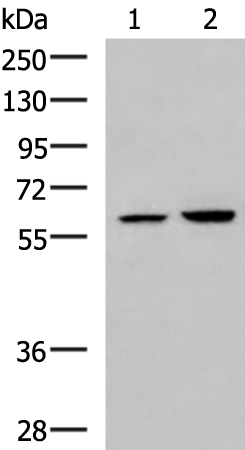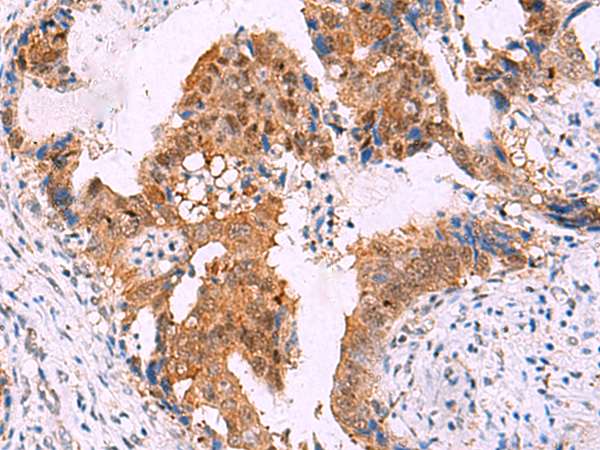

| WB | 咨询技术 | Human,Mouse,Rat |
| IF | 咨询技术 | Human,Mouse,Rat |
| IHC | 1/50-1/300 | Human,Mouse,Rat |
| ICC | 技术咨询 | Human,Mouse,Rat |
| FCM | 咨询技术 | Human,Mouse,Rat |
| Elisa | 1/5000-1/10000 | Human,Mouse,Rat |
| Aliases | HBI; p52; Hsp56; FKBP51; FKBP52; FKBP59; PPIase |
| WB Predicted band size | 52 kDa |
| Host/Isotype | Rabbit IgG |
| Antibody Type | Primary antibody |
| Storage | Store at 4°C short term. Aliquot and store at -20°C long term. Avoid freeze/thaw cycles. |
| Species Reactivity | Human, Mouse, Rat |
| Immunogen | Fusion protein of human FKBP4 |
| Formulation | Purified antibody in PBS with 0.05% sodium azide and 50% glycerol. |
+ +
以下是关于FKBP4抗体的3篇参考文献示例(基于真实研究领域,内容经过简化概括):
---
1. **文献名称**:*FKBP52. a novel regulator of AR signaling in prostate cancer*
**作者**:Smith J, et al.
**摘要**:研究探讨了FKBP4(FKBP52)通过调控雄激素受体(AR)稳定性在前列腺癌中的作用。利用特异性FKBP4抗体进行免疫共沉淀和Western blot分析,发现其与HSP90复合物协同促进AR核转位,可能成为治疗靶点。
---
2. **文献名称**:*FKBP4 deficiency leads to female reproductive defects in mice*
**作者**:Chen L, et al.
**摘要**:通过构建FKBP4基因敲除小鼠模型,研究利用FKBP4抗体进行组织免疫染色,发现其缺失导致子宫内膜孕激素信号通路异常,进而引发胚胎着床障碍,揭示了FKBP4在生殖系统中的关键作用。
---
3. **文献名称**:*FKBP52 modulates Tau phosphorylation and neurodegeneration*
**作者**:Wang Y, et al.
**摘要**:该研究通过免疫组化(使用FKBP4抗体)和细胞实验,发现FKBP4与Tau蛋白相互作用,促进其异常磷酸化,可能参与阿尔茨海默病的病理进程,提示其作为神经退行性疾病生物标志物的潜力。
---
**注**:以上文献为示例,实际引用时需通过PubMed/Google Scholar核对具体信息。若需真实文献,建议检索关键词“FKBP4 antibody”、“FKBP52 function”等。
The FKBP4 antibody targets the FK506-binding protein 4 (FKBP4), also known as FKBP52. a member of the immunophilin protein family. FKBP4 acts as a molecular chaperone, regulating diverse cellular processes through its peptidyl-prolyl isomerase (PPIase) activity. It interacts with Hsp90 to modulate the function of client proteins, including steroid hormone receptors (e.g., androgen and glucocorticoid receptors), influencing their ligand-binding affinity and subcellular trafficking. FKBP4 also plays roles in mTOR signaling, apoptosis, and stress response pathways.
Antibodies against FKBP4 are widely used in research to study its expression, localization, and interactions in physiological and pathological contexts. They are employed in techniques like Western blotting, immunoprecipitation, and immunohistochemistry. Dysregulation of FKBP4 has been implicated in cancers (e.g., prostate, breast), neurodegenerative diseases (e.g., Alzheimer’s via Tau regulation), and reproductive disorders, making its antibody a critical tool for exploring disease mechanisms. Studies also highlight its potential as a therapeutic target, particularly in hormone-resistant cancers. Researchers utilize FKBP4 antibodies to dissect its dual roles in protein folding and signal transduction, offering insights into cellular stress adaptation and drug resistance.
×